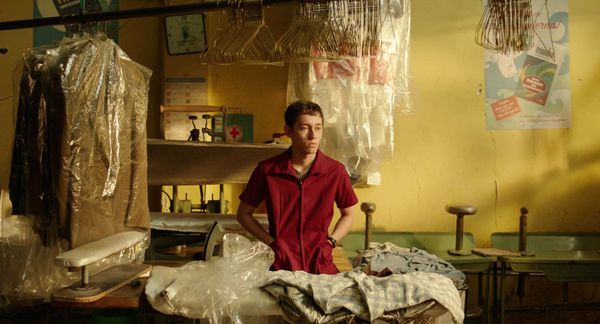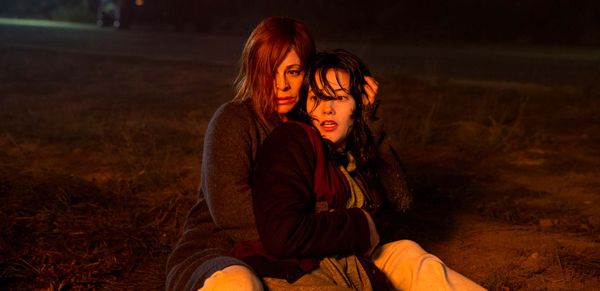 |
| Lonesome Collectors Photo: Courtesy of Tallinn Black Nights Film Festival |
Lonesome Collectors (Noches De Julio)
From the outside, young Julio (Hoze Melendez) looks to be merely a 'weirdo' and a 'creep' - words actually used of him by his boss at the laundromat, by the landlady for whom he never has full rent, and even by his own father. Yet we know from the very beginning of Lonesome Collectors (Noches de Julio), as we see Julio stroking and breathing in items of clothing, that he is also a sensualist. In fact, Julio is emotionally crippled and lacking in the most basic social skills, and so confines himself to intimate relations with others through their material possessions alone. Instead of getting to know people, he secretly tries on their clothes, and breaks into their homes when they are away to inhabit an idea of their inner lives without - in theory - leaving any trace of himself.
Not that this furtive, vicarious existence prevents Julio from seeming the very definition of a creep - and it does not help that his actions recall the supremely creepy secretive home invasions of, say, Kim Ki-duk's 3-Iron (2004), Jaume Balagueró's Sleep Tight (2011) and Dominic Bridges' Freehold (2017). Julio is, after all, a stalker, even if it is clear that he would be terrified of any conversation, let alone actual physical contact, with his targets. His loneliness and social isolation are gaps that he fills with fantasies about people which he draws from the superficial trappings of their lives - and so he is akin to an online lurker, stealthily visiting the chatrooms, feeds and pages of others without ever interacting. As such, Julio is figured as a romantic for the internet age - and Axel Muñoz's feature debut takes a turn towards quirky romance as Julio discovers that there is someone else (Florencia Ríos) out there just like him who has in fact been sneaking into his dingy apartment all the time that he has been elsewhere. If only these larcenous lovers can meet and make their dreams come true together - although by the end, any such coupling comes with the suspicion that we might still be witnessing Julio's imaginative fantasy.
Cursed Seat (Proigrannoe mesto)
After telling a (vividly presented) urban myth around a fire, a group of high school seniors discuss whether the story is true or not - they conclude that it is, even though its climax is a direct lift from The Texas Chainsaw Massacre 2 (1986) - and whether its apparently supernatural elements can be entirely rationalised.
In actress Nadezhda Mikhalkova's directorial debut Cursed Seat (Proigrannoe mesto), this opening sequence will turn out to be programmatic. The film presents another urban myth which, for all its obvious irrationality, will become real in the lives - and, in some cases, deaths - of these teens, forcing them to address the same questions (can it be true? is there a rational explanation?) while racing to discover who or what is killing them one by one. For shortly after bullied loner Roma (Nikita Elenev) tells them the story of a 'lost' seat in a cinema - "If you sit in it," he says, "you'll die" - the kids find that their illicit trips to the local movie house always end in a grotesque demise for one of them.
As Katia (Irina Martynenko), already grieving her boyfriend Yura's death by decapitation, works out the seat's number, she finds herself caught between the complicated interpersonal machinations of her various friends, her own addled, oneiric perspective, and an ongoing investigation conducted by a pair of middle-aged police officers who cannot quite believe what the younger Russian generation gets up to these days. What ensues is a wild metacinematic ride through teen horror tropes that will keep you guessing to the very end whether this is a case of a genuine curse or just a bog-standard psycho. Along the way, expect thrills that are trashy, fun and knowing, all exposing today's selfie-and-sex-obsessed youth at their best and worst. Horror fans would be mad to miss it - but just be careful where you sit in the cinema.
 |
| The Pact Photo: Courtesy of Tallinn Black Nights Film Festival |
The Pact (El Pacto)
Not to be confused with Nicholas McCarthy's 2012 film of the same name, David Victori's slick debut The Pact (El Pacto) shows frantic mother Mónica (Belén Rueda) entering a sinister cultic contract to keep her diabetic teenaged daughter Clara (Mireia Oriol) alive, even as Mónica's policeman ex-husband Álex (Dario Grandinetti) investigates some very peculiar incidents. The contract itself, a never fully explained supernatural agreement involving 'albino spiders', paradoxical hourglasses and the intricate workings of fate, requires that Mónica kill others, whether actively or passively, to avoid seeing the realisation of her 'worst nightmare': her daughter succumbing to illness.
The hourglass, measuring out the time left before Clara will die, serves as a metaphor both for the inevitable disease or death that will befall our loved ones, and for the dark thoughts, fears and desires which this inevitability imposes on us. Accordingly, it offers a moral metric, like the mysterious dilemma mechanism from Richard Kelly's The Box (2009), also delivered to the home; or like the ever-encroaching death in David Robert Mitchell's It Follows (2014), which features a similar 'date rape' scene in which a young man passes on a curse to his girlfriend in an isolated parking spot.
Either way, this ticking time bomb of death is something that in fact we all have - and Mónica's desperate, self-deluding attempts to stop, or at least to slow, the sands of time make her a figure all at once heroic, tragic and villainous. For, in her immense anxiety and grief, Mónica wishes that someone other than her beloved Clara might die - or at least die first. Though horrific and reprehensible, this wish is also confronting precisely for being so understandable - and the choice and agency which the the pact purports to offer to those looking death in the eye will turn out to be entirely illusory.
The Fall Of The American Empire (La Chute De l'Empire Américain)
In 1986, director/co-writer Denys Arcand released The Decline of the American Empire, in which an ensemble of academics discuss their sex and society. Decades later, in 2003, he revisited this collective of characters - with one now terminally ill - in The Barbarian Invasions, whose principal preoccupations were healthcare and death. The title of his latest, The Fall Of The American Empire, obviously marks it as forming a loose trilogy with those previous two films - and even if it focuses on a new character, Pierre-Paul Daoust (Alexandre Landry), he too is an academic, and his girlfriend 'Aspasie' (Maripier Morin) is, like Perre's in the first film, a sex worker whom he meets through her personal services.
The main theme here is the morality of money, as Pierre-Paul, a sincere and somewhat naïve delivery man with a doctorate in ethics and a strong sense of social justice, chances upon two bags full of stolen cash and, in a fateful moment, decides to take them in his truck. With ruthless criminal gangs and the police circling, our hero - and we along with him - receive a quick masterclass in international banking, tax evasion and the many ways in which money can be hidden.
Here Arcand is showing the iniquitous workings of the global economy, bringing advantage to the very rich at the expense of the poor. He is also posing crucial questions about whether it is possible to do the right thing with ill-gotten gains - while implying that almost all money is in some way dirty. Pierre-Paul is a good man, and his actions inspire goodness in the high-class prostitute and the money launderer (Rémy Girard) with whom he surrounds himself - but we are left to wonder how many people could resist the siren call of money, and the consequences of its pursuit, in the real world as opposed to in one of Arcand's cinematic thought experiments. So this is an exemplary film, and we would all be better off living up to its ultimately improbable standards rather than to those, say, of the (expressly name-checked) Trump.





















